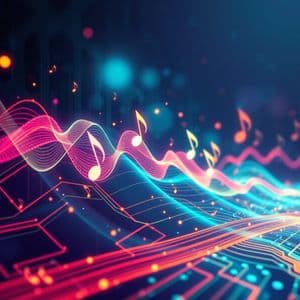BitcoinWorld Generative Music: OpenAI’s Astonishing New Tool Revolutionizes Audio Creation In the fast-evolving digital landscape, where blockchain innovations are constantly redefining ownership and creativity, the latest buzz from OpenAI signals a profound shift in how we perceive and produce 0 a world where unique musical compositions can be conjured from simple text prompts, ready to be minted as exclusive digital assets or enhance virtual 1 isn’t science fiction; it’s the imminent reality as OpenAI reportedly dives into developing a new generative music tool, promising to democratize sound creation and open new avenues for digital artists and enthusiasts 2 Dawn of Generative Music: OpenAI’s Latest Leap The news, initially reported by The Information, suggests that OpenAI, a pioneer in artificial intelligence, is expanding its creative horizons beyond text and video 3 new endeavor involves a sophisticated system capable of producing music from various inputs, including text descriptions and existing audio 4 move positions OpenAI at the forefront of a burgeoning field, pushing the boundaries of what machines can ‘understand’ and ‘create’ in the realm of auditory 5 implications for content creators, from independent musicians to large-scale media producers, are vast, offering tools that could dramatically reduce production times and costs while fostering unprecedented levels of creative 6 the Potential of OpenAI’s New Creation What exactly could this new AI music tool offer?
Sources close to the project hint at several transformative 7 the ability to instantly generate background scores for videos, tailor-made to fit the mood and pace of the 8 consider musicians who could provide a vocal track and have the AI seamlessly add a guitar accompaniment, a full orchestral backing, or even a jazz 9 functionality suggests a future where musical collaboration transcends human-only interaction, allowing creators to rapidly prototype ideas, fill instrumental gaps, or even discover entirely new 10 tool’s potential to integrate with existing platforms like ChatGPT and Sora also raises exciting possibilities for multimodal content creation, where narratives, visuals, and sounds are woven together by 11 Does This AI Music Tool Work?
While specific technical details remain under wraps, the core concept revolves around advanced machine learning models trained on vast datasets of musical scores and audio 12 intriguing detail mentioned in the report is OpenAI ‘s collaboration with students from the prestigious Juilliard 13 partnership involves annotating musical scores, a crucial step in providing high-quality training data for the 14 feeding the model rich, structured musical information, OpenAI aims to teach the AI not just to produce sounds, but to understand musical theory, harmony, rhythm, and 15 rigorous training is essential for developing an AI music tool that can generate not just noise, but truly compelling and contextually appropriate 16 Rise of Text-to-Music: A New Creative Frontier The concept of generating music from simple text prompts, or text-to-music , represents a significant leap in human-computer 17 typing ‘a melancholic piano piece with rain sounds for a reflective scene’ and receiving a bespoke composition within 18 capability could empower individuals without formal musical training to bring their auditory visions to 19 seasoned professionals, it could serve as an unparalleled brainstorming partner, generating variations and ideas that might otherwise take hours or days to 20 OpenAI has previously explored generative music models, these new developments leverage the company’s recent advancements in large language models and multimodal AI, promising a level of sophistication and coherence not seen 21 the Hype: The Future of AI Innovation in Music The emergence of AI innovation in music isn’t limited to 22 like Google and Suno have also been making strides in generative music, showcasing the industry-wide push towards automating and assisting creative 23 competitive landscape drives rapid development, benefiting users with increasingly powerful and accessible tools.
However, this progress also brings forth critical discussions around copyright, intellectual property, and the role of human artists in an AI-augmented 24 these tools become more sophisticated, the line between human and machine creativity will blur, necessitating new frameworks for attribution, compensation, and ethical 25 potential for AI to democratize music creation is immense, but navigating its societal impact will be 26 of Generative Music Tools The advent of sophisticated generative music tools like the one reportedly being developed by OpenAI offers a plethora of benefits across various sectors: Democratization of Music Creation: Individuals without formal musical training can now create professional-sounding tracks, lowering the barrier to entry for aspiring artists and content 27 Content Production: For filmmakers, game developers, advertisers, and podcasters, AI can quickly generate custom soundtracks, saving significant time and resources in 28 Creative Exploration: Musicians can use AI as a collaborative partner, generating new ideas, variations, or accompaniments, pushing their creative 29 Experiences: AI-generated music can be tailored in real-time for personalized user experiences in apps, games, or virtual environments, adapting to user actions or 30 Efficiency: Reducing the need for expensive studio time, session musicians, or licensed music, making high-quality audio more 31 of Archival Content: AI could be used to restore or augment old recordings, or even generate new pieces in the style of historical 32 and Ethical Considerations While the promise of AI innovation in music is exciting, it also presents significant challenges and ethical dilemmas that require careful consideration: Copyright and Ownership: Who owns the copyright of AI-generated music?
The developer, the user who prompted it, or the AI itself? This is a complex legal area currently being 33 Displacement: Concerns exist that widespread adoption of AI music tools could reduce demand for human composers, session musicians, and sound 34 and Authenticity: Can AI truly replicate human emotion and nuance in music, or will AI-generated tracks lack the ‘soul’ and authenticity listeners seek? Data Bias: If training data is biased towards certain genres or styles, the AI’s output might perpetuate those biases, limiting diversity in new 35 and Misinformation: The ability to generate realistic audio could be misused to create deepfake voices or manipulate audio recordings, raising concerns about 36 Models: New models will be needed to fairly compensate all parties involved in the creation and distribution of AI-generated 37 of Generative Music in Action (Current and Future) While OpenAI’s tool is still in development, other companies and research projects already demonstrate the power of generative music : Google’s MusicLM: Capable of generating high-fidelity music from text descriptions, even long, complex 38 AI: A popular platform that allows users to create songs with vocals and instrumentals from simple text 39 (Artificial Intelligence Virtual Artist): Used to compose soundtracks for films, commercials, and video 40 Music: Focuses on generating adaptive music for content creators, adjusting to length and 41 applications could include: Dynamic Soundscapes in Gaming: Game music that adapts in real-time to player actions, narrative progression, and environmental 42 Wellness Audio: AI-generated meditation music or focus tracks tailored to individual biometric data or 43 Art Installations: Musical experiences that respond to audience movement or environmental 44 Insights for the Crypto Community For those immersed in the world of cryptocurrency and blockchain, AI innovation in music presents unique opportunities: NFTs of AI Art: AI-generated musical compositions could become unique, verifiable NFTs, offering new revenue streams for creators and 45 Autonomous Organizations (DAOs) for Music: DAOs could govern the creation, ownership, and monetization of AI-generated music, distributing royalties fairly among 46 Royalties: Future music platforms could use blockchain to tokenize royalties from AI-generated tracks, allowing fractional ownership and transparent 47 Economy Boost: Lowering the barrier to music creation can lead to more diverse content, potentially increasing the supply of unique audio assets for Web3 48 Integration: AI music can provide dynamic, adaptive soundtracks for metaverse experiences, enhancing immersion and personalization within virtual 49 Asked Questions About OpenAI’s Generative Music Tool Q: What is OpenAI reportedly developing?
A: OpenAI is reportedly developing a new generative music tool that can create music based on text and audio prompts. Q: What are some potential uses for this tool? A: It could be used to add music to existing videos, provide guitar accompaniment to vocal tracks, or generate entirely new compositions from descriptions. Q: Is OpenAI new to generative music?
A: No, OpenAI has launched generative music models in the past, but the new tool is expected to leverage more recent advancements in AI, building on the success of ChatGPT and Sora . Q: Which institution is collaborating with OpenAI for training data? A: The Juilliard School is reportedly working with OpenAI students to annotate scores for training data. Q: Are other companies developing similar tools?
A: Yes, companies like Google and Suno also have generative music models. Q: Where did the initial report about OpenAI’s tool come from? A: The initial report was published by The Information , with further coverage by Anthony Ha from Bitcoin 50 The prospect of OpenAI ‘s new generative music tool marks a thrilling chapter in the evolution of artificial intelligence and creative 51 the full scope of its capabilities and launch timeline remain to be seen, its potential to transform how music is conceived, produced, and consumed is 52 democratizing access to professional-grade audio creation to fostering novel forms of digital art, this AI innovation is poised to reshape our auditory 53 we stand on the cusp of this musical revolution, the blend of human ingenuity and machine capability promises an exciting, albeit complex, future for 54 learn more about the latest AI market trends, explore our article on key developments shaping AI models features, institutional 55 post Generative Music: OpenAI’s Astonishing New Tool Revolutionizes Audio Creation first appeared on BitcoinWorld .
Story Tags

Latest news and analysis from Bitcoin World



